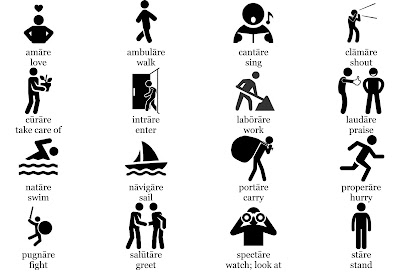When studying verbs, there are certain key grammatical terms with which you need to be familiar:
[1] infinitive: this is the form of the verb before any changes are made to it; this is not obvious in English which is why the infinitive is often given with the word ‘to’ e.g. to eat
[2] a verb has [a] person [b] number [c] tense and [d] conjugation; there are other concepts that apply to verbs but, for the moment, we only need these four:
[a] person: who / what is performing the action
[b] number: how many people / things are performing the action
I work: first person singular [abbreviated to 1 sg.]
You work: second person singular [2 sg.]
He / she / it / my father works: third person singular [3 sg.]
We work: first person plural [1 pl.]
You (people) work: second person plural [2 pl.] This is included because, while English does not distinguish in grammar between talking to one person or more than one person, Latin, as for example in French, German, and Spanish, does distinguish them.
They work: third person plural [3 pl.]
[c] tense: this refers to when the action is / was / will be performed e.g. I am going (present) / I went (past) / I shall go (future)
[d] conjugation: in the same way that Latin nouns belong to different declensions according to the endings that the noun takes, so too do verbs belong to different groups depending on how the verb endings are formed, and those groups are known as conjugations.
If you are unfamiliar with grammatical terms, take some time to become familiar with those given above.
Here, we will look at the first conjugation:
labōrāre: infinitive = to work
To form the present tense of the verb, you remove the -re of the infinitive; this leaves you with the stem of the verb.
labōrā¦
To the stem you add the following endings, but note that in the first person singular, the -ā- of the stem is also removed to avoid a vowel clash.
labṓr¦Ō [I work; I do work; I am working]
labṓrā¦S [You (sg.) work]
labṓra¦T [He / she / it works]
labōrā́¦MUS [We work]
labōrā́¦TIS [You (pl.) work]
labṓra¦NT [They work]
Notes:
[i] The stem is sometimes long /ā/ and sometimes short /a/ but remember that, in written Latin, the macron was not used.
[ii] The accent mark [ʹ] is only there to indicate the syllable which is stressed. You should not use it when regularly writing in Latin. It will not be used in any other examples.
[iii] In English, there are three ways the present tense is expressed: I work (present simple), I do work (when being emphatic), I am working (present continuous); that is not the case in Latin because the one present tense can express all three ideas.
[iv] The endings on the verb are known as the personal endings i.e. Latin verbs do not need pronouns to indicate who / what is performing the action.
-ō: I
-s: you (sg.)
-t: he / she / it
-mus: we
-tis: you (pl.)
-nt: they
There are thousands of verbs that are formed in the same way, and you have already seen another:
habitāre: to live
Ubi habitĀS? Where do you live?
In Ītaliā habitŌ. I live in Italy.
Here are some other verbs to get you started:
amāre: to love
ambulāre: to walk
cantāre: to sing
clāmāre: to shout
dare: to give (no long /ā/ in the infinitive)
errāre: to wander; to make a mistake
laudāre: to praise
lavāre: to wash
natāre: to swim
navigāre: to sail
parāre: to prepare
portāre: to carry
properāre: hurry
pugnāre: to fight
spectāre: to watch; look at
stāre: to stand
The normal word order in a Latin sentence is to place the verb at the end.
Pater meus in Hispaniā labōrat. My father works in Spain.
Servus vīnum portat. The slave is carrying the wine.
However, that is by no means a hard and fast rule but, at this early stage, it is best to stick to it since it is the word order most commonly found.



No comments:
Post a Comment